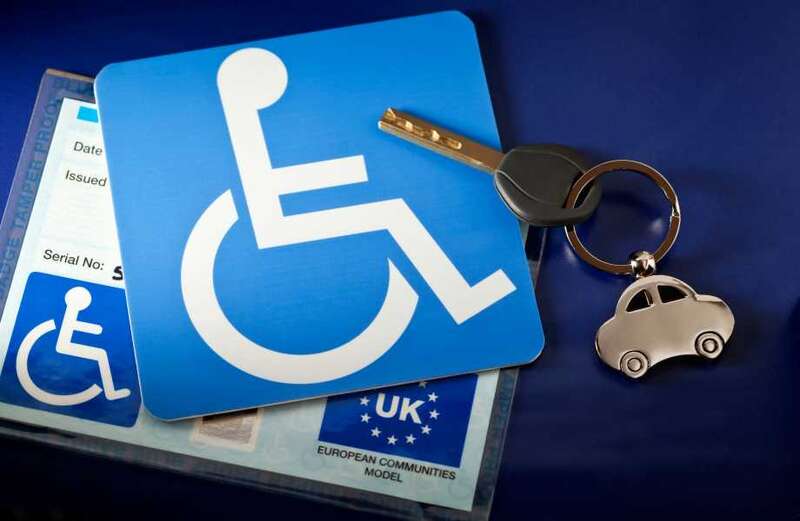PARKING spaces reserved for blue badge holders allow people with disabilities to park in places other people can't.
Having a blue badge parking permit doesn't let you park anywhere, however, and there are still some restrictions.

Where can I park with a blue badge?
As long as there are no loading or unloading restrictions, blue badge holders can park on single or double yellow lines for up to three hours.
They must display their badge with the parking clock set to the time they arrived.
If there is an on-street pay-and-display machine or parking meter, blue badge permit holders can park there for free with their badge visible.
 Are there illegal baby names? Surprising monikers that are BANNED in other countries, from Sarah to Thomas
Are there illegal baby names? Surprising monikers that are BANNED in other countries, from Sarah to Thomas
Additionally, anywhere showing a sign that says blue badge parking is ok to use.
Some private car parks do still charge for disability parking so it is always best to double check.
Check the website or contact the council or owners of the car park if you are unsure if you can park somewhere,
Blue badge holders still must obey the rules of the road and not park illegally because, as the government website states, the badge is "not a licence to park anywhere".
Who can use the blue badge?
Anyone with a disability that limits their ability to walk is eligible for a blue badge.
Those who are unable to walk, have difficulty walking, come to harm or cause harm while walking can use a blue badge.
Anyone who is registered blind or has a disability in their arms can also get a badge.
A blue badge can be used whenever a holder has to travel or park somewhere, either as a driver or passenger.
It cannot be used by other people doing something on a holder's behalf - unless they are going to be in the vehicle too.
How do I display the badge?
To display the badge correctly it needs to be on the dashboard or facia panel of the car or vehicle.
 All about Rachel Nickell who was murdered in front of her son Alex Hanscombe
All about Rachel Nickell who was murdered in front of her son Alex Hanscombe
If that is not possible, it needs to be displayed somewhere clearly visible from the outside.
The hologram should be facing up and the side with the photograph should not be visible from the outside.
It is important that visually impaired people ensure whoever is displaying the badge for them knows the correct way.
If not, this could result in parking fines or penalty charge notices.
The blue parking clock showing the time of arrival needs to be displayed in time-limited spaces.
A clock should come with your badge but, if not, one can be requested from the council.
What benefits can I claim if I have a blue badge?
Some benefits automatically qualify someone for a blue badge.
If you are on higher rates of Disability Living Allowance (DLA) or Personal Independence Payment (PIP) you will automatically get a blue badge.
A blue badge does not impact your ability to claim support from the government if you are eligible.
Many badge holders are also eligible for road tax exemption and can get a full refund for the remaining months when applying for exemption.
Certain toll roads are also free to cross if you have a blue badge.
Blue badge holders can also request a disabled parking space is created close to their home.
Can blue badge holders park in normal parking bays?
If there is no space to park in a disabled bay or a shared-use bay is easier, blue badge holders can park in them too.
The same rules apply for a normal bay but remember to display your badge or you may be charged like everyone else.
Disabled parking bays are designed to help make parking and access easier so tend to be closer to entrances and bigger.
It is therefore usually better to park in a specified bay.
Blue Badge holders are not allowed to park in loading bays.
Can I use my blue badge abroad?
The blue badge scheme used to cover you when travelling across the EU but, now that the UK has left the EU, not all European countries recognise the blue badge.
The UK government states that the UK blue badge can be used when travelling in some EU countries, Liechtenstein, Norway and Switzerland.
Recognition of the badges remains at the discretion of the administering authority in the host country, so the best idea is to check with your destination country's embassy.
Guidance varies outside of the EU too, with some US states recognising the badge but others not.
Disabled travellers are advised to check the FIA guide to check the rules.
When do I have to return the badge?
Blue badges expire every three years and must be returned once this happens.
A new badge can be requested from the council, with costs varying across the UK.
In the case that you lose the badge and request another, the original badge must be returned if found at a later date.
If the badge fades or becomes illegible, it is no longer legal and must be returned.
On the death of the badge holder, it must also be returned to the council.
